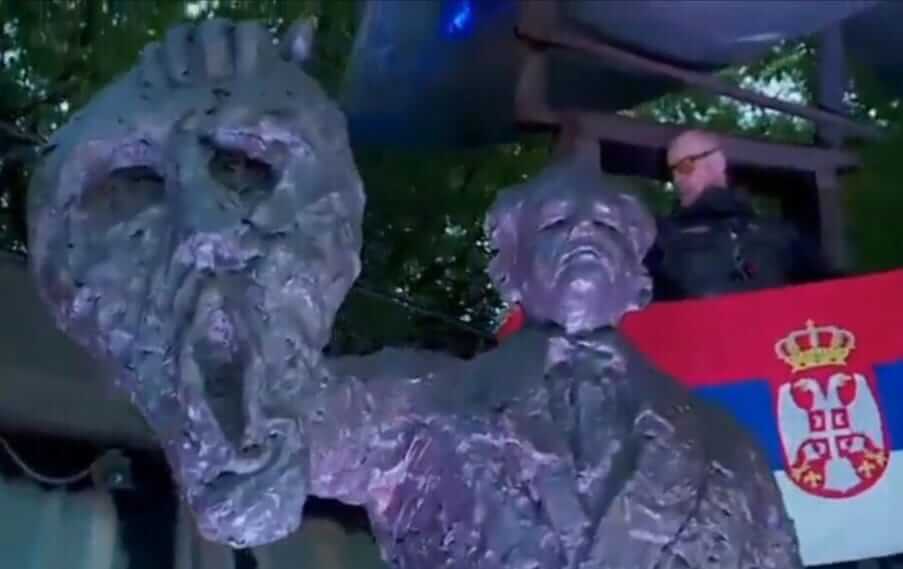It is a good thing the discussion about raising a monument to Slobodan Milosevic has ended. There it is in Moscow, so anyone who wants to pay tribute to him for all he has done can go on a pilgrimage immediately. His brothers will meet him there, those who also think that Milosevic fought for the right cause and “victory over the forces of darkness,” as they recently said when they unveiled the bronze statue of the late Serbian president in Moscow.
Russia is the right place for a monument to Milosevic. Serbia is not because it has not raised it during his lifetime or 17 years after his death, even though such proposals existed. Russia always knew better what was best for Serbia.
Russia knows this, so using a powerful symbolism such as the monument, Russia has told Serbia it needs to wise up and get back on the right path. For Russia, that is the path of Slobodan Milosevic.
The monument unveiling in Moscow is an act of the Russian state, not only Milosevic’s sympathisers from both countries. The authorities permitted its installation. At the small ceremony, the guest of honour was one of Vladimir Putin’s closest friends, otherwise the leader of the biker group Night Wolves.
These are imitators of characters from Hollywood movies who drive American motorcycles (because there are no Russian ones) and wear costumes imitating bad guys driving on American roads, spreading fear and trepidation. However, the Russian copy of Hells Angels cannot stand America. They fight against it and against everything it represents. After all, Russia remembers Milosevic as a comrade in arms in the epic battle, and the Kremlin sent them to be a part of the formal act of unveiling the statue.
This performance is an important political message to Serbia, its state leadership and its people. Moscow thinks we should be reminded of when we were to its liking. The honour given to the former Serbian president should make us remember. That was the president who supported the putschists from the top of the Russian army, those who tried to preserve the Soviet Union and prevent Perestroika.
It represents a message that we should return to a state of confrontation with the entire world when we were isolated by sanctions, even though Russia voted in favour of sanctions in the UN. Moscow thinks that we should return to conflicts with everyone in the closest neighbourhood and start a war, if necessary, because that’s the only way we could show how superior we are, compared to everyone in the Balkans, just as Russia has been trying to prove its superiority in Ukraine.
This is Serbia according to today’s Russia, the Serbia of the late 80s and 90s, Milosevic’s Serbia. Using the monument to Milosevic in Moscow, that kind of Serbia has been trying to turn into a mythical country which knew from the start who its enemy was but did not have enough men, ammunition, and money to defeat him.
Russia admires this kind of Serbia. By celebrating Milosevic, Russia thought it paid tribute to his time, which it wanted to declare “heroic”. That was when the Serbian people experienced the greatest shame and fall and when lives were lost.
Russia has been “selling” this to Serbia as a model it should use and probably unite against the world’s greatest enemy, the West. The word war was mentioned at the ceremony next to the monument for a reason. War was an inseparable part of Milosevic’s legacy. His son Marko who self-exiled to Russia, spoke about the war (“We lost the battle but not the war”).
He is one of many fugitives from justice who need to explain before the courts in their country what they did as the untouchable people from the 90s when the country disintegrated. He is one of those embraced by Russia as a favourite refuge for the lords of misfortune from the Milosevic period, including his family.
Russia has been sending Serbia postcards with sugary slogans about historical brotherhood and a mission to reshape the world according to our collective standards instead of proving friendship and brotherhood towards Serbia by extraditing wanted persons. It is still doing it today while raising a monument to the man who ruined his own country, turning him into a visionary and a hero.
If Slobodan Milosevic has been the main link between Serbia and Russia, then Serbia does not need such a link. Russia needs this because only with Serbia, personified by Milosevic, could it realise its ideas of an ideal Balkan ally. Destroyed, rejected by the world, poor, without a future and constantly on the edge of war.
What kind of new world did they discuss at the foot of the Milosevic monument? Those whose country has been destroying Ukraine because it dared to ask for freedom, united with their “brothers,” Serbs, who wish for a new war against the Ukrainians in their neighbourhood.
The monument in Moscow is a dark reminder of the dark history of Serbia. Serbia has already said what it thought about that period. Serbia has never raised a statue of the man who pushed it in that period and led it for years. Let him stay in Russia. Let them worship him and lay flowers while together they dream about a great Russia and a great Serbia and the “new world” they will create together out of the war and misfortune of others.
